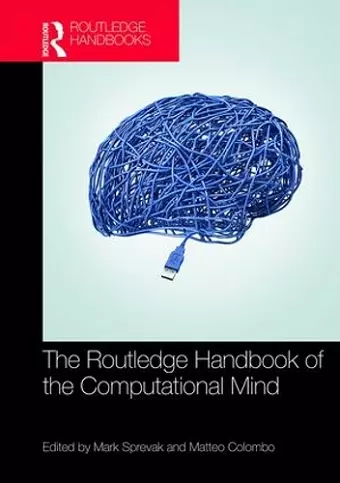The Routledge Handbook of the Computational Mind
Mark Sprevak author Matteo Colombo author Mark Sprevak editor Matteo Colombo editor
Format:Hardback
Publisher:Taylor & Francis Ltd
Published:28th Aug '18
Currently unavailable, and unfortunately no date known when it will be back
This hardback is available in another edition too:
- Paperback£46.99(9780367733667)

Computational approaches dominate contemporary cognitive science, promising a unified, scientific explanation of how the mind works. However, computational approaches raise major philosophical and scientific questions. In what sense is the mind computational? How do computational approaches explain perception, learning, and decision making? What kinds of challenges should computational approaches overcome to advance our understanding of mind, brain, and behaviour?
The Routledge Handbook of the Computational Mind is an outstanding overview and exploration of these issues and the first philosophical collection of its kind. Comprising thirty-five chapters by an international team of contributors from different disciplines, the Handbook is organised into four parts:
- History and future prospects of computational approaches
- Types of computational approach
- Foundations and challenges of computational approaches
- Applications to specific parts of psychology.
Essential reading for students and researchers in philosophy of mind, philosophy of psychology, and philosophy of science, The Routledge Handbook of the Computational Mind will also be of interest to those studying computational models in related subjects such as psychology, neuroscience, and computer science.
"One of the many strengths of this volume, skilfully edited by Mark Sprevak and Matteo Colombo, is that it reminds us of how long scientists – many of them psychiatrists (including R. D. Laing) – have wrestled with issues of computation in the mind and brain. This book is particularly timely given the wealth of opinion pieces and working-group position papers on computational psychiatry[.] … My academic work is infused by computation and, rather than the ‘busman’s holiday’ feel I get from many books on topics in which I feel invested, I felt inspired and eager to learn more after reading this book. ... The Handbook grounds computational psychiatry as a tool rather than a doctrine, a balanced and practical approach I suspect [Ada] Lovelace would have endorsed." - Philip R. Corlett, The British Journal of Psychiatry
"Anyone interested in the fundamental issues confronted by computational approaches to mind will find this collection indispensable. Packed full of penetrating and insightful analyses from expert contributors, it not only perfectly captures the history and the current state of this important field, it helps set the agenda for its future." - Michael Wheeler, University of Stirling, UK
"This Handbook offers an unparalleled guide to navigating the world of computational cognitive science. It is a timely reminder of why cognitive science needs philosophy: our empirical claims are only as good as the conceptual frameworks that undergird them." - Sam Gershman, Harvard University, USA
"This excellent book will be the foundation of myriad university courses. Particularly impressive is the way that many of the chapters adopt an approach that is informed, but never overwhelmed, by philosophical reasoning. This makes the book an incisive and informative read." - Peter Dayan, University College London, UK
ISBN: 9781138186682
Dimensions: unknown
Weight: 1044g
510 pages